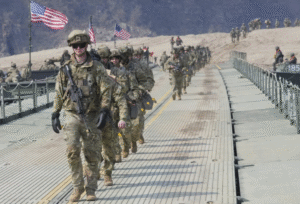The Department of Homeland Security (DHS) has requested the deployment of 20,000 National Guard troops to assist with immigration enforcement across the United States, according to a department spokesperson.
DHS Assistant Secretary Tricia McLaughlin stated that the department will use all available tools and resources to remove “criminal illegal aliens, including gang members, murderers, pedophiles, and other violent criminals,” emphasizing that protecting American citizens is the top priority.
This request, currently being reviewed by the Pentagon, is part of a broader effort by the Trump administration to accelerate deportations and fulfill campaign promises of mass removals of undocumented immigrants. The initiative will also involve Border Patrol agents being deployed throughout the country, alongside a growing crackdown by the Justice Department on immigration-related offenses in multiple cities.
Officials have expressed frustration with the relatively slow pace of interior arrests, which are often more resource-intensive than detentions at the border. As a result, the administration is seeking additional personnel support, including thousands of National Guard members, to boost enforcement capacity.
Guard units are expected to assist Border Patrol in states where governors authorize their involvement. They would operate under state rather than federal command, under what’s known as Title 32 authority. This model mirrors the approach taken by Texas Governor Greg Abbott in 2021 when he mobilized state law enforcement and the Texas National Guard to support immigration enforcement efforts at the southern border.
Earlier this year, a memorandum of understanding between U.S. Customs and Border Protection and the Texas National Guard granted certain state Guard personnel immigration enforcement powers under CBP supervision.
National Guard units assigned to the effort will support arrest operations and provide “force protection” for agents on the ground. While they are not expected to conduct arrests directly, their status under state control exempts them from restrictions under the Posse Comitatus Act, which prohibits federal military forces from engaging in domestic law enforcement.
In recent months, the U.S. military has also sent thousands of active-duty troops to the southern border, primarily for patrols, construction, and logistical support — not arrest duties. These forces, governed by Title 10 authority, are barred from law enforcement roles unless the president activates the Insurrection Act.
Last month, both the Pentagon and DHS advised against invoking the Insurrection Act, noting that border crossings were relatively low and that current authorities were sufficient to manage the situation.













